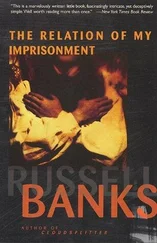His third wife, Jenny, however, left and divorced him for no other reason than his supposed treatment, his mistreatment, of his mother and his refusal to confirm or deny the local description of that mistreatment (there was no local explanation for it, of course). It was assumed by the townspeople that because Jenny was middle-aged, childless, and, it was discovered, an orphan, she had married Hamilton with the hope of obtaining thereby a ready-made family. When it appeared that he was as orphaned and childless as she, and thus could not deliver what she desired from him, she had swiftly returned to her previous way of life as the school nurse and, later on, as athletic director of the girls’ sports program. Some people thought that Jenny may have been a lesbian and that her marriage to Hamilton had been a last, vain attempt to kindle and warm herself with a “normal” sexual relationship, but to believe that, they would have been compelled to attribute “normal” sexual proclivities and needs to Hamilton, which by then no one was willing to grant him. Not that anyone suspected he was homosexual. Rather, no one could imagine his being tender. People could easily understand why women were initially attracted to him—“After all,” they said, spreading their hands and lifting their eyebrows, “he is good-looking, in a largish way, and he makes a decent living, and he has a nice house, now. And he is a beautiful dancer. He’s a smooth talker, too, when he wants to be. So if you’d just met him, and if he wasn’t drinking too much, not drunk, I mean, well, who knows, there’s lots of women who might think he’d be a good catch. At least at first.” And indeed, five women in Hamilton’s lifetime so far had thought so and, as a result, had pitched themselves into his lap. And he had married them for it. As he put it when, after each divorce, he was asked why he had married the woman in the first place, especially as with each consecutive wife the courtship and marriage became more and more abbreviated: “Hey, what’s a man to do? When a woman tells you she loves you, you can’t tell her not to. And if you don’t particularly dislike the woman, there’s no point in telling her you dislike her. No woman wants to hear a lie like that, even when it’s true. And frankly, I never met a woman I disliked.” In recent years, however, he would add, “Course, I never met one I liked, either. Maybe if I had, I wouldn’t have gotten married so many times, heh, heh, heh.”
His fourth wife, Maureen Blade, only eighteen when she married him, probably was too young to be able to evaluate her new and much older husband’s past behavior, or even his present behavior, for that matter. That’s both the advantage and disadvantage, for the elder, of choosing a mate who is still not much more than a child: she has not yet been exposed to enough adult behavior to recognize when it is abnormal. The whole idea of “normality” depends on the availability of a fairly large sampling, which would necessarily be unavailable to an eighteen-year-old girl, no matter how precocious. And Maureen was not thought to be especially precocious. By the time she had been Mrs. Hamilton Stark for six months, however, she had aged considerably, if not matured as well, and the whole question of precocity was no longer relevant. After her divorce from Hamilton, she resumed the use of her maiden name, Blade, but to no avail. No one could think of her as a maiden anymore. She was a young divorcée, a woman with a complicated past.
But Maureen was the only one of Hamilton’s five wives who already knew the story of his break with his mother when she married him. A psychiatrist might suggest that, in marrying him, she was working out, through identification with his well-known acts against his parent, her own desires to behave similarly toward her parent, a drunken lout, Arthur Blade, a chronically unemployed lout who had mistreated his eldest daughter for years, beating her and, it was rumored, even making sexual advances against her. One might, if one were that same psychiatrist, also suggest that in marrying Hamilton she was seeking a replacement for her father, for, not more than a month before the marriage, Arthur Blade had been committed to the New Hampshire State Hospital in Concord, where his extreme alcoholism could be treated, at least temporarily.
In any case, Hamilton refused to act the father for her, no more the kind father than the cruel; he treated her the way he treated any other adolescent, tolerating her enthralled presence, exchanging goods for services and vice versa, and whenever she asked for something more, some direct expression of his personal affection, say, he responded by demanding more of her first, such as more room in which to move without having to explain or justify his moves. “If you think you can make a man report back to you who he is, where he goes and where he cannot go, and that by doing so he will be acting out of love for you, you’re dead wrong. A man will do these things for you only if he is afraid of losing you. And fear of losing a woman and loving her are not the same thing. Actually, they may be opposites,” he told her, and immediately Maureen fell into confusion and despair, a state he encouraged and she endured for six months, until she at last realized that she would be rid of her confusion and despair only when she had got rid of her husband. She knew that she would then, as a direct result, have many other unpleasant thoughts and feelings to live with — such as what it meant to be an eighteen-year-old ex-wife in a small New Hampshire town — but she no longer cared. Besides, she could always say that he had treated her no better than he had treated his own mother. Then everyone would understand her leaving him, especially those people who had not been able to understand why she had married him in the first place.
So she told him that she wanted a divorce. He said, “Fine with me, if that’s what you want.” He would not contest it, as he had not contested any of his divorces (“I never contested the marriage, did I? Why should I contest the divorce?”), as long as there were no demands for alimony and no demanding property settlement. She could take whatever she wanted of what she had brought with her. Anything else she wanted he would sell to her at one-half the market value. So she packed her clothes in her battered suitcase and went back to live in her father’s house, to care for her five younger brothers and sisters until her father was released from the state hospital, at which time she hoped to move down to Manchester or some other city, maybe Boston, where she could find a job in a factory and get an apartment of her own and maybe buy a red car.
His fifth wife, Dora, on the other hand, until Alma’s actual funeral, knew nothing of her husband’s break with his family. Naturally, she knew about his other wives and his daughter Rochelle, for he made no secret of their existence. (Oddly, for such a talked-about man, he made no secret of anything; there was no question he would not answer; it’s just that very few people knew what to make of his answers or how to avoid having their next question manipulated by the answer to the preceding one.) She had asked, as did all but his first wife, if he had ever been married before, and he had answered, “Of course.” She asked him how many times. “Four.” So many! Were there any children? she wondered. “Yes.” And how many children? “One.” Hamilton never offered information gratuitously, so if you didn’t know ahead of time precisely what your question was, and then asked it, it was likely that he would never provide the answer. For instance, in the above interrogation, what Dora really wanted to know was, “Who, if anyone, do you love more than you love me?” To that question, he probably would have simply said, “No one.” Whether or not she felt comforted by his answer would depend on whether or not she had been able to assume that he loved her in the first place. Dora, however, believed that when a person told her he loved no one more than he loved her, he had already answered the question of whether or not he loved her in the first place. Thus it was not till later, after Alma’s funeral, that it even occurred to Dora to ask her husband if he loved her at all. “I can’t tell you I love you,” was his answer. Her next question, even though they had been married for no longer than a few months was, “Would you give me a divorce if I asked for it?” And, once again, he said, “Fine with me, if that’s what you want.” And by then, indeed, it was what she wanted. She had seen enough, heard enough, by then. The form of the interrogation, more than its content, and Hamilton’s strict and what seemed to some his almost fanatically pure adherence to the form had trapped her. As she would later say, “He didn’t exactly tell me to leave, but it was obvious to me that I had no choice.”
Читать дальше












